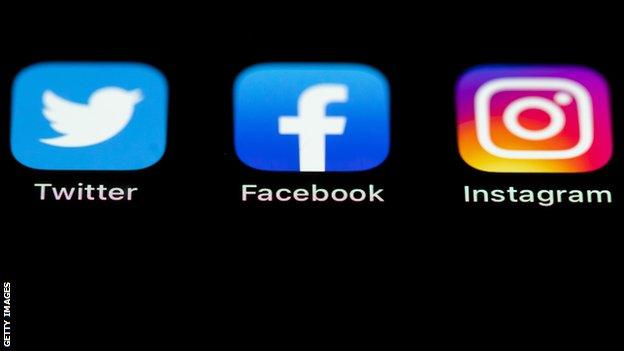Social media boycott: Premier League clubs join four-day move to tackle abuse
- Published

English football clubs and institutions will boycott Twitter, Facebook and Instagram for four days
Premier League, English Football League and Women's Super League clubs will join in a four-day boycott of social media platforms in an effort to combat abuse and discrimination.
The boycott will start on 30 April.
The Football Association, as well as league bodies and other organisations, including anti-discrimination charity Kick it Out, will also be involved.
"This boycott signifies our collective anger," said Kick it Out's chairman Sanjay Bhandari.
"Social media is now sadly a regular vessel for toxic abuse.
"By removing ourselves from the platforms, we are making a symbolic gesture to those with power. We need you to act. We need you to create change.
"We need social media companies to make their platforms a hostile environment for trolls rather than for the football family."
Sheffield United's David McGoldrick, who was racially abused last year, welcomed the move, saying: "It is about time. What has gone off on social media, it has happened to me.
"It has happened to many players. Something needs to happen, it is too easily to get racially abused on there."
Speaking to Sky Sports on Saturday night after scoring in his side's 1-0 win over Brighton, the striker added: "The Super League got cut off in 48 hours, why is racism on the back foot? It is bigger in my eyes."
Brighton forward Neal Maupay has also been the subject of online abuse and he told Sky Sports the boycott was a "very good" move.
"The players get a lot of abuse online and we need to fight it. It's a good way to do it. It's good that we are in this together," the Frenchman said.
The Football Supporters' Association, Professional Footballers' Association, League Managers' Association, Women in Football, Women's Championship and its clubs as well as refereeing body Professional Game Match Officials Limited (PGMOL) have also committed to the boycott of Twitter, Facebook and Instagram.
The move will come three weeks after Swansea City turned off their social media accounts for a week to make a stand against abuse following a number of their players being targeted.
Championship rivals Birmingham City and Scottish champions Rangers followed Swansea's lead in announcing a boycott of social media.
Former Arsenal and France striker Thierry Henry removed himself from all social media in March because of racism and bullying across platforms.
In an interview with BBC's Newsnight programme, the 43-year-old said "enough was enough" and that he had to make a stand against racism on social media.
Earlier in April, Liverpool said racist abuse on social media "cannot be allowed to continue" after Trent Alexander-Arnold, Naby Keita and Sadio Mane were targeted in April.
A joint statement from English football's governing bodies said the boycott is a way "to emphasise that social media companies must do more to eradicate online hate", while also "highlighting the importance of educating people".
"Boycott action from football in isolation will, of course, not eradicate the scourge of online discriminatory abuse, but it will demonstrate that the game is willing to take voluntary and proactive steps in this continued fight," the statement continued.
The FA's director of equality and diversity Edleen John said "English football will not tolerate discrimination in any form".
"We are calling on organisations and individuals across the game to join us in a temporary boycott of these social media platforms, to show solidarity and unite in the message," she said.
"Social media companies need to be held accountable if they continue to fall short of their moral and social responsibilities to address this endemic problem."
Allow X content?
This article contains content provided by X. We ask for your permission before anything is loaded, as they may be using cookies and other technologies. You may want to read X’s cookie policy, external and privacy policy, external before accepting. To view this content choose ‘accept and continue’.
The UK government has previously threatened social media companies with "large fines" which could amount to "billions of pounds" if they fail to tackle abuse on their platforms.
Facebook said in February that tougher measures would be taken to tackle the issue.
Last week, Instagram - which is owned by Facebook - announced a tool to enable users to automatically filter out abusive messages from those they do not follow on the platform.

Are you a pub quiz whizz? Then test your knowledge of the Oscars
No Passion, No Point is back: Eddie Hearn chats to the Rio Ferdinand about his next career move
